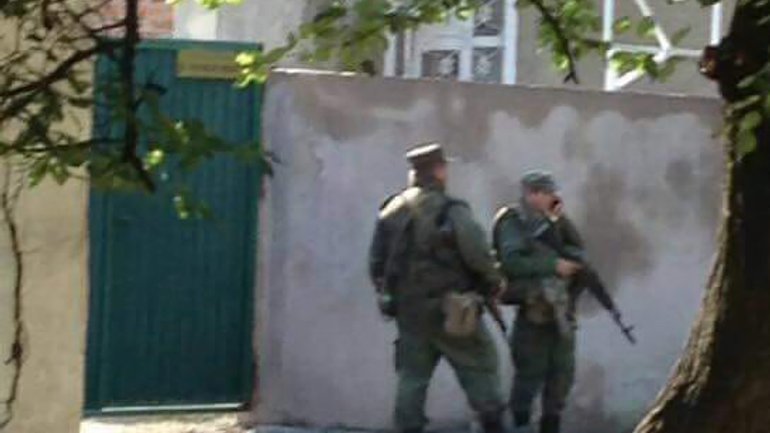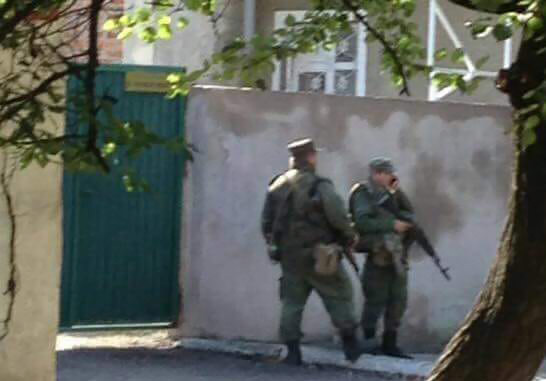Armed militants attack Baptist House of Prayer in Russian-controlled ‘Luhansk republic’

A group of armed militants from the self-proclaimed ‘Luhansk people’s republic’ [LPR] have seized an Evangelical Baptist House of Prayer in Brianka and driven out the believers, turning the whole place upside down. According to the Ukrainian Union of Evangelical Baptist Christians, these representatives of the Russian-backed ‘republic’ left only after it was made clear to them that the building was the private property of one of the believers.
Petro Dudnyk, Pastor of the Good News Evangelical Church in Sloviansk and a tireless volunteer from the beginning of the military conflict, reports that the Church in Brianka handed out water and food to hundreds of people in need during the most critical times during the past four years. He says that the Church has continued up till now to take in and provide refuge to all those in need, regardless of their religious affiliation and ethnic origin. Informs website of the Kharkiv Human Rights Protection Group.

This is not the first such armed raid and / or seizure of churches in areas until Kremlin-backed militant control. On 6 July this year, Alexander Moseychuk, Pastor of the New Life Church in Makiyivka reported that seven representatives of the so-called ‘Donetsk people’s republic’ [DPR], some of them armed had burst into the church, announced that it no longer belonged to and announced that it was being taken over. There are around 120 believers whose church has been taken from them. Pastor Alexander also stressed that the New Life Church had helped over 700 people in need since the beginning of the war. According to the Institute for Religious Freedom, there were similar moves on 10 June in Donetsk, with the Church of the Holy Spirit in Donetsk, which is under the Ukrainian Orthodox Church of the Kyiv Patriarchate, forcibly closed by people from the so-called ‘DPR state property fund’. On 27 March 2018, men in military gear turned up at a Baptist place of worship in Stakhanov [within ‘LPR’], forced their way into the premises and took out everything, including furniture and items used during services.
The situation varies somewhat in the two Kremlin-controlled ‘republics’, however both demonstrate the same basic intolerance for all faiths, except the Orthodox Church under the Moscow Patriarchate.
In ‘DPR’, for example, a new ruling, following from the so-called ‘law on freedom of faith and religious organizations’, in force since May 2018, prohibits the activities of any religious organization that has not undergone ‘re-registration’ by 1 March 2019. Believers report that their churches or religious organizations have been told that if they don’t re-register, they will face a ban on their religious activities and ‘confiscation’ of all their property.
Since an ‘expert assessment’ is required in order to obtain such ‘re-registration’, it is likely that this will be used as an opportunity to ban some churches. As was to be expected after the past four years, the Orthodox Church under the Moscow Patriarchate will not have to go through any of this, and will instead have a simplified ‘legalization’ process.
Both ‘DPR’ and ‘LPR’ are directly following Russia in repressive measures against the Jehovah’s Witnesses. ‘DPR’ recently banned almost all Jehovah’s Witness material, claiming it to be ‘extremist’, while in February ‘LPR’ banned the Jehovah’s Witnesses and other ‘non-traditional’ faiths. This was after they passed several ‘laws’, including one aimed at hunting down and prohibiting so-called extremism in religious or political organizations, as well as in the media.
On 28 August 2017, they claimed that the Jehovah’s Witnesses were helping Ukraine’s Security Service [SBU] and “neo-Nazi groups”. An investigative search had supposedly established not only that the Jehovah’s Witnesses in Luhansk and Alchevsk were in breach of ‘LPR law’, but that they were probably “agents of influence of the Ukrainian Security Service.
The militants do not only target Christian churches. As reported, the only mosque remaining in occupied Donetsk was closed in late June, after an armed search and interrogation of the Imam and worshippers. The so-called ‘DPR law’ on countering extremist activities was cited as the grounds.
Churches under the Moscow Patriarchate have enjoyed special treatment from the beginning, with religious persecution of all other faiths becoming a grave problem from the beginning of the Russian-backed, manned and armed military conflict in April 2014.
A 2015 study by human rights groups entitled ‘When God becomes the weapon’ identified systematic and widespread religious persecution, and reported that religion was one of the key motivating factors and justification cited for criminal activities by unlawful paramilitary groups within the self-proclaimed ‘Donetsk and Luhansk people’s republics’
A major role had been played by unlawful armed groups who “under the banners of the Russian Orthodox Army and the Cossack Army, openly manifest their adherence to orthodoxy and have begun a ‘crusade’ across the Donbas region”.
The supposed ‘Russian World’, which the militants see themselves as defending, has been endorsed by the head of the Russian Orthodox Church Patriarch Kirill (more details here).
It is quite likely that the situation will deteriorate further following the aggressive reaction shown by the Moscow Patriarchate and Russia to the decision by the Universal Patriarchate in Constantinople to grant autocephaly to the Ukrainian Orthodox Church under the Kyiv Patriarchate.









